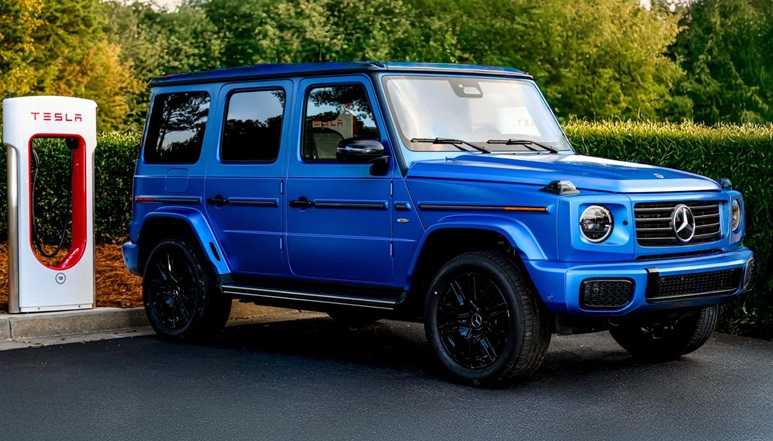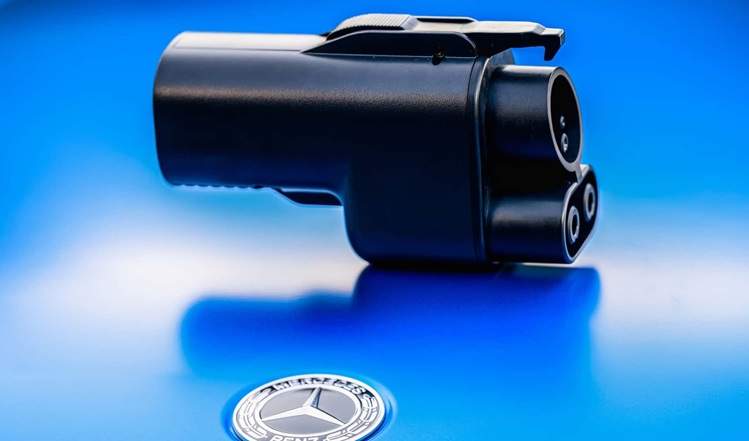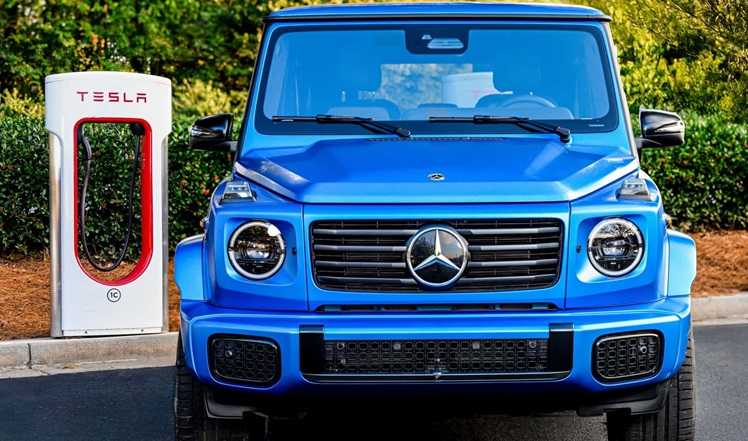Mercedes-Benz EVs owners in the United States are set to benefit from an expanded charging network, thanks to a recent partnership with Tesla. Beginning next month, Mercedes-Benz EV drivers will gain access to over 20,000 Tesla Supercharger stalls across the U.S. and Canada, a significant enhancement to their charging options. This collaboration integrates Tesla’s Superchargers into the Mercedes me Charge service, which already connects drivers to other charging networks, including Electrify America, EVgo, ChargePoint, and Ionity.

With this addition, Mercedes-Benz EV drivers will have access to over 110,000 public charging points across North America. For Canadian drivers, the Tesla Supercharger integration will roll out later this year, further expanding the charging landscape for Mercedes-Benz customers.
How Mercedes-Benz EV Owners Can Use Tesla Superchargers
To utilize Tesla’s highly regarded DC fast-charging network, Mercedes-Benz EV owners will need a NACS-to-CCS1 charging adapter. This adapter, available at dealerships for $185, ensures compatibility between the Tesla Superchargers and the CCS1 charging ports currently installed in Mercedes-Benz EVs. Interestingly, the adapter appears to be manufactured by Lectron, which sells its Vortex adapter for $199.99. Mercedes-Benz’s pricing offers a small but welcome discount for its customers.
The Lectron-made adapter is designed for high performance, supporting up to 1,000 volts and 500 amps, ensuring fast and reliable charging for modern EVs.
Plug & Charge Functionality
Mercedes-Benz EVs will also support Tesla’s Plug & Charge feature, streamlining the charging process. With this functionality, drivers simply plug in their vehicle, and the charging session starts automatically, provided they’ve set up a payment method in the Mercedes me Charge app.
However, not all Mercedes-Benz EVs are Plug & Charge-ready out of the box. Some models will require a software update, which must be applied at a dealership. The automaker will notify affected customers and schedule service appointments to ensure their vehicles are upgraded.
For vehicles without the software update, charging sessions can still be initiated, but drivers will need to use the smartphone app to start and stop the session manually. This extra step is necessary because Tesla’s Superchargers lack physical buttons or screens for user interaction.
One of the standout features of this integration is how seamlessly Tesla Superchargers will be incorporated into Mercedes-Benz’s in-car navigation system. Drivers will be able to view real-time information about charger availability, pricing, and stall locations directly on their vehicle’s display.
This convenience ensures that Mercedes-Benz EV owners can plan charging stops efficiently, taking advantage of Tesla’s widespread and reliable Supercharger network.

A Step Towards NACS Compatibility
Later this year, Mercedes-Benz will adopt Tesla’s NACS (North American Charging Standard) connector as the standard charging port for its new EVs. This transition means that future Mercedes-Benz vehicles will no longer require a NACS-to-CCS1 adapter to use Tesla Superchargers. However, this shift may create a new need for CCS1-to-NACS adapters for charging at stations that don’t yet offer NACS cables.
This strategic move aligns with the broader industry trend toward standardizing charging connectors, simplifying the experience for EV drivers across different brands and networks.
Expanding Charging Options
Franz Reiner, Chairman of the Board of Management at Mercedes-Benz Mobility AG, highlighted the company’s commitment to providing unparalleled charging accessibility.
“By opening access to Tesla Superchargers in North America to our customers, we underline our commitment to providing as many charging options as possible,” said Reiner. “The fast-growing network of charging points available in Mercedes me Charge will now expand to over 110,000 public charging points across the United States and Canada, providing Mercedes-Benz drivers with an industry-leading charging experience whenever and wherever they choose to charge.”
This partnership enhances the flexibility of Mercedes-Benz EVs, ensuring drivers have access to some of the best charging options in North America.

The integration of Tesla Superchargers marks a significant milestone for Mercedes-Benz, giving its EV drivers a competitive edge in charging convenience. The Supercharger network’s reputation for reliability and speed positions Mercedes-Benz as a leader in offering seamless charging experiences.
This development also reflects a broader shift in the EV industry toward collaboration, as automakers work together to improve charging infrastructure and enhance the overall EV ownership experience.
Key Takeaways
- Expanded Charging Network: Mercedes-Benz EV owners will soon have access to over 20,000 Tesla Supercharger stalls in the U.S. and Canada, in addition to the 110,000 public charging points already available through the Mercedes me Charge service.
- Affordable Adapter: A NACS-to-CCS1 adapter, priced at $185, will allow current Mercedes-Benz EVs to use Tesla Superchargers seamlessly.
- Plug & Charge Convenience: Automatic Plug & Charge functionality simplifies the process, though some vehicles may require a dealership software update to enable this feature.
- Future Compatibility: Starting later this year, Mercedes-Benz EVs will come equipped with NACS ports, eliminating the need for adapters at Tesla Superchargers but introducing potential new needs for CCS1 compatibility.
- Enhanced Navigation Integration: Tesla Superchargers will be fully integrated into the Mercedes-Benz navigation system, providing real-time updates on availability and pricing.
- Industry Collaboration: This partnership underscores the importance of automakers working together to improve the charging experience for all EV owners.
As Mercedes-Benz EVs embrace Tesla’s Supercharger network, the move demonstrates the brand’s commitment to enhancing customer convenience and flexibility. For Mercedes-Benz drivers, this collaboration offers a brighter and more accessible future for electric vehicle charging in North America.
Related Post
